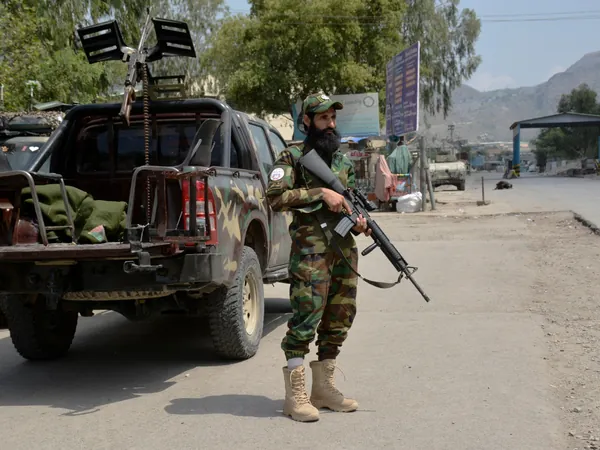
Tensions Soar as Pakistan Launches Airstrikes Against Taliban in Afghanistan; Retaliation Looms
2024-12-25
Author: Jessica Wong
In a dramatic escalation of hostilities, the Pakistani military conducted airstrikes late Tuesday night in Afghanistan's Paktika province, directly targeting hideouts of the Tehrik-i-Taliban Pakistan (TTP), an armed group waging an insurgency against the Pakistani government. These operations have reignited concerns of retaliatory violence from the Taliban-led Afghan government, who have labeled the airstrikes a "cowardly act."
While no formal comments were made by Pakistan’s Ministry of Foreign Affairs, sources confirmed the strikes occurred in the Barmal district, a region adjoining Pakistan's South Waziristan in Khyber Pakhtunkhwa. The Taliban reported that at least 46 individuals, including women and children, were killed in the bombardment, directly opposing Pakistan's claims that they were targeting TTP militants.
Enayatullah Khowarazami, spokesperson for Afghanistan's Defense Ministry, took to social media to express the Taliban's outrage, stating, “The Islamic Emirate will not leave this cowardly act unanswered,” insisting that defending Afghan sovereignty is an inviolable right. This sharp rhetoric underscores the increasing friction between the two nations, which had only recently seen diplomatic talks aimed at fostering bilateral cooperation.
The airstrikes mark a worrying trend, particularly as they come on the heels of intergovernmental discussions. Just hours earlier, Pakistan's special representative for Afghanistan had met with interim Afghan Foreign Minister Amir Khan Muttaqi in Kabul to discuss enhancing bilateral relations. However, analysts believe these military actions will further strain already fraught ties.
Escalating Attacks and Security Concerns in Pakistan
The backdrop to these air raids is a rising tide of violence attributed to the TTP, which Pakistan alleges uses Afghanistan as a base for cross-border assaults. Just last week, TTP militants claimed responsibility for a brutal attack that killed 16 Pakistani soldiers in South Waziristan, the deadliest incident involving Pakistani security forces in recent months.
Notably, the TTP has built a significant presence in Afghanistan, boasting an estimated 6,000 fighters, according to Pakistani officials. The organization is described as the largest terrorist group operating in the region, posing a persistent threat to Pakistan's national security. Heightened tensions have led to over 1,500 violent incidents across Pakistan this year alone, resulting in hundreds of deaths among both civilians and law enforcement personnel.
The ongoing security crisis has prompted Islamabad to undertake extensive military operations within its borders and beyond, including a recent campaign named Azm-e-Istehkam (Resolve for Stability). Security experts suggest that airstrikes are likely part of a broader strategy aimed at neutralizing the TTP threat.
A Fragile Balance of Power
With the resurgence of violence, the potential for Taliban retaliation hangs heavily in the air. Experts warn that the TTP may seek revenge for the airstrikes, igniting further cycles of violence. Analysts note that while the Taliban has publicly condemned the attacks, the real response may come from within the TTP ranks, who reportedly view these strikes as an affront to their cause and have discussed retaliatory measures.
This fragile dynamic poses significant challenges for Pakistan, which, despite its military might, grapples with a lack of a coherent and sustainable policy toward Afghanistan. Historical patterns show that Pakistan's approach is often reactionary, driven more by immediate threats than by long-term strategy.
Conclusion: Implications for Regional Stability
The recent airstrikes and the Taliban's vehement warnings of retaliation signal a dangerous turning point in Pakistan-Afghanistan relations, one that threatens to destabilize the already volatile region further. As the international community watches closely, the need for a comprehensive diplomatic strategy becomes more urgent. Without it, both nations risk descending further into a cycle of violence that could have lasting implications for regional peace and security. Will the two sides find a way back to the negotiating table, or is this the prelude to a broader conflict?


 Brasil (PT)
Brasil (PT)
 Canada (EN)
Canada (EN)
 Chile (ES)
Chile (ES)
 España (ES)
España (ES)
 France (FR)
France (FR)
 Hong Kong (EN)
Hong Kong (EN)
 Italia (IT)
Italia (IT)
 日本 (JA)
日本 (JA)
 Magyarország (HU)
Magyarország (HU)
 Norge (NO)
Norge (NO)
 Polska (PL)
Polska (PL)
 Schweiz (DE)
Schweiz (DE)
 Singapore (EN)
Singapore (EN)
 Sverige (SV)
Sverige (SV)
 Suomi (FI)
Suomi (FI)
 Türkiye (TR)
Türkiye (TR)